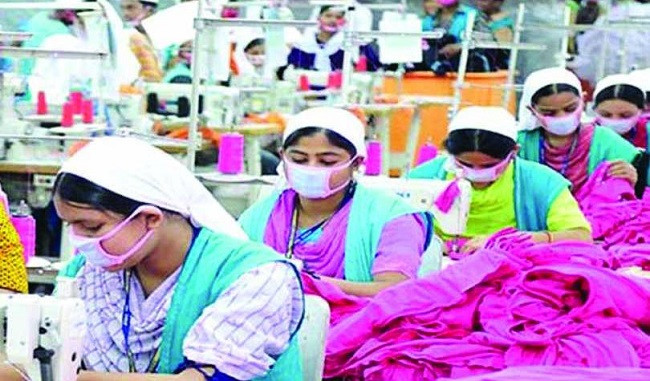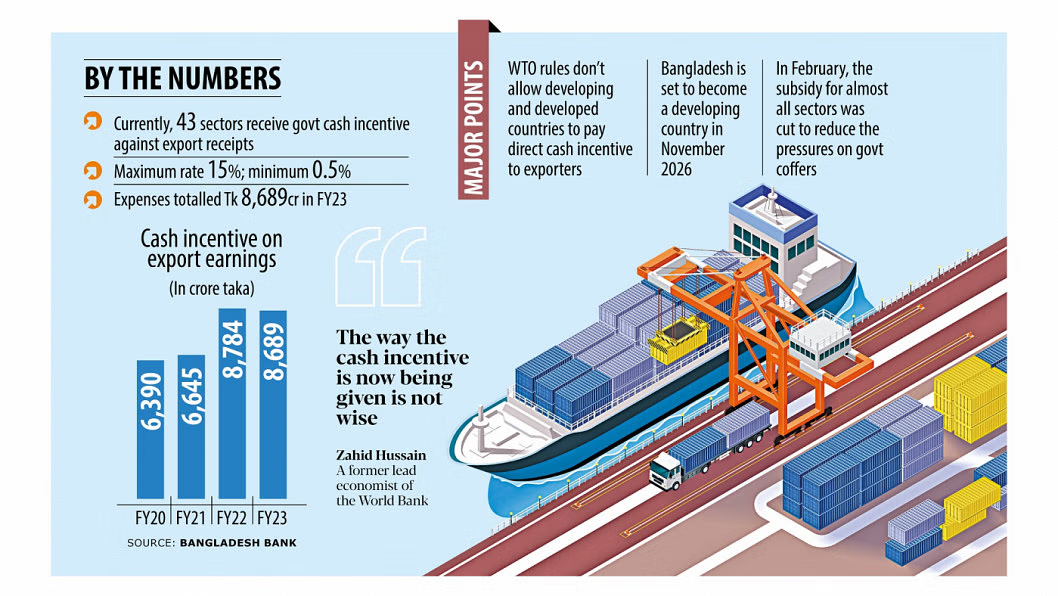Bangladesh’s readymade garments (RMG) industry is going through a troubled time and to survive in the crisis period the government should provide policy support and incentives with continuation of existing benefits in the next budget for the fiscal year 2023-24.
In the last two consecutive months, the export earnings from the clothing sector showed a downtrend, which raised concern among the exporters.
According to Export Promotion Bureau (EPB) data, Bangladesh’s export earnings from apparel items posted a 15.48 percent negative growth to $3.32 billion in April, which was $3.9 billion in the previous year.

Figure: The export earnings from the clothing sector showed a downtrend, which raised concern among the exporters.
On the other hand, exporters are witnessing slower inquiry and work order flows for the next season. Amid the gloomy picture and future forecast, there is no alternative to government policy support to survive.
Urgent needs for the RMG sector in FY24
For the survival of the country’s export-oriented apparel sector and to retain export growth, business-friendly tax measures and incentives are a must in the next budget for FY24 to be announced in the parliament on June 1.
“Right now we are under tremendous pressure due to external and internal economic shocks. To absorb these shocks a lower source tax and cash incentive for non-cotton goods export in the next national budget will act as catalysts to turnaround,” said Bangladesh Garment Manufacturers and Exporters Association (BGMEA) President Faruque Hassan.
As the global economies are suffering due to the Russia-Ukraine war and soaring raw material prices and hiked utility service increased the cost of production, we are urging the government to reduce source tax at 0.5 percent and set it for the next five years, said the business leader.
In the current fiscal year, exporters are paying a 1 percent source tax, which was 0.5 percent in the previous fiscal year.
Reducing source tax to 0.5 percent will be a great tool to reduce the production cost and retain competitiveness, said Hassan.
On the other hand, the BGMEA leader also urged the government to reduce corporate tax from the existing 12 percent to attract new investment from home and abroad.
Exporters also need cash incentives against the exports of non-cotton products.
“As of now, over 75 percent of Bangladesh’s apparel export earnings are concentrated on cotton products. Only 24 percent of exports are from non-cotton known as manmade fiber. The demands of non-cotton and manmade fiber products are growing in the global market,” said Bangladesh Knitwear Manufacturers and Exporters Association (BKMEA) executive president Mohammed Hatem.
As a result, we are asking for a 10 percent cash incentive against export exporting non-cotton items to attract new investment in the category, he said.
The sector people also demanded the withdrawal of a 10 percent tax on incentives.
In addition to this, exporters called for the continuation of cash incentives against exports to non-traditional markets and traditional markets.
Currently, exporters enjoy 4 percent cash incentives against exports to non-traditional exports and 1 percent for traditional markets.
Meanwhile, textile millers also need simplification of the taxation system with the 0.5 percent source tax and continuation of existing benefits.
“In the next budget for FY24, the government should lift the value-added tax on local sourcing of recycled yarn and offer a cash incentive facility to encourage local value addition,” said BTMA president Mohammad Ali Khokon.
He also sought VAT exemption on the fabrics manufactured from artificial fiber.
Garment accessories and packaging manufacturing are contributing a lot but they are not enjoying equal tax benefits. For their contribution and to encourage new investment, the government should offer equal benefits for the sector.
“Accessories sector is playing an important role in meeting the demands from local sources but we are not getting the same benefits from the government,” said Mohammad Moazzem Hossain, President of Bangladesh Garments Accessories & Packaging Manufacturers & Exporters Association (BGAPMEA).
In the next budget, our demands are equal benefits such as 12 percent corporate tax and cash incentives against direct export of packaging and accessories items, said Moazzem.
He also demanded other policy support under the National Export Policy as it is recognized as an export-oriented sector.
What experts suggest
With the present economic and geopolitical situation, the apparel sector needs special attention in the next budget for FY24.
“Global economic crisis hit Bangladesh exports and the clothing industry is the prime earner. So, the budget should be exporter friendly and continuation of incentives is a must,” said Khondaker Golam Mozzem, Search Director at the Centre for Policy Dialogue (CPD).
A 0.5 percent source tax, corporate tax and incentives should continue in the budget for FY24 for the turnaround of the sector, said the economist.
Meanwhile, there is a strong logic against the demand for cash incentives for non-cotton exports as future business growth will depend on it highly, he added.
He also suggested taking steps which will attract new investment, product diversification and encourage exporters to move towards manufacturing high-value products.
















